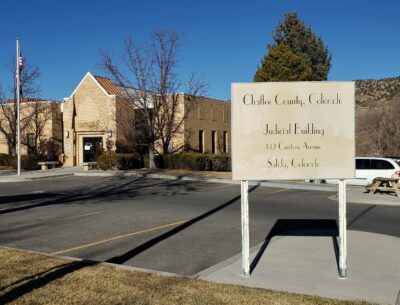Chaffee County has been roiled lately by the sudden closure of the Chaffee Childcare Initiatives program at The Schoolhouse in Poncha Springs, and the filing of misdemeanor charges against the program’s executive director and the center director. The county was seriously short of early childhood care slots even before the action, and the closure of 24 early childcare slots threw the county into a childcare crisis.

Chaffee County Judicial Facility at 142 Crestone in Salida is the home of the 11th District Court. Merrell Bergin photo
Prior to the March 10 motions filing deadline, attorneys for Amy Lovato and Roberta Rodriguez filed a motion to dismiss the charges. The pretrial court date is set for 9:30 a.m. Thursday, March 30, in the 11th Judicial District Court located at 142 Crestone avenue, in Salida.
The case began with what some have called excessive force actions that shut down The Schoolhouse without notice, followed by criminal charges against The Schoolhouse Director (Rodriguez), and the Executive Director of the Chaffee Childcare Initiative (Lovato). As covered by Ark Valley Voice, the instigating actions were two incidents self-reported by The Schoolhouse.
Among the many aspects of the situation that has upset the parents of the two dozen children who attended The Schoolhouse, and those in the community trying to understand what happened is the swiftness of the action, which has been explained by the Chaffee Department of Human Services (DHS) as completely driven by procedure and the perceived threat.
If that is the case, then it remains unanswered why other centers across the state appear to have been given more latitude than The Schoolhouse.
In fact, a single “Report of Inspection” by the Colorado Department of Human Services for a Larimer County child care facility obtained by Ark Valley Voice reveals a litany of problems at that center during a single September 7, 2022 inspection including:
- Failure to meet caregiver-to-child ratios
- Failure to report a child’s injury to the family and failure to complete a department injury report
- Failure to call 911 during a medical emergency involving a head injury
- Falsified emergency drill logs and staff training certificates
- Missing child abuse and neglect background checks
- Staff not qualified for their positions; documented cases of infants given to assistant teachers
- Inadequate supervision, including toddlers dancing on tables, a child left unattended on a diaper changing table
- A staff member who fell asleep while supervising children
- A staff member yanking a child by the wrist and using harsh words with children.
This single facility had nine infractions in one inspection — some of them incredibly serious: caregivers not calling 9-1-1? Falsified emergency drill logs and training certificates? Inadequate supervision of children including a staffer FALLING ASLEEP while supervising children? Actual verbal abuse of children?
The result? Not only was the child care center not shut down, but it was given 30 days to correct the deficiencies. This appears to represent a marked difference from the abrupt shutdown of The Schoolhouse which did not even include an inspection or a phone call. Chaffee DHS and the Chaffee County Sheriff’s officers just — showed up.
According to the official report from the Chaffee Department of Human Services (DHS) and the Chaffee County Sheriff’s Office Incident Report, The Schoolhouse was closed following self-reports of: a couple of minutes lapse in the caregiver-to-child ratio in a classroom during nap time (with the in-room teacher attending to a child in the classroom’s in-room bathroom), and incidents during a week related to a five-year-old doing a “pants-pulling-down” incident with another child, for which the Center Director and Chaffee Childcare Initiative Executive Director were charged with child abuse.
The inconsistencies between the situation in the first childcare facility example outlined above, and The Schoolhouse are rather obvious. So what does it take in the state of Colorado for a childcare center to be shut down? Why does it appear to be inconsistently applied across the state?
Ark Valley Voice set out to understand what is behind the decision to shut down the Schoolhouse with no warning and to charge adults for a child’s behavior that pediatric mental health professionals have termed developmentally-normal behavior that at that age should not be sexualized according to adult standards.
 Ark Valley Voice asked a series of questions in a conversation with the Colorado Department of Early Childhood (CDEC) and received some interesting answers.
Ark Valley Voice asked a series of questions in a conversation with the Colorado Department of Early Childhood (CDEC) and received some interesting answers.
We first asked what the word “founded” meant, when written after a particular licensing concern item such as “Staff not appropriately trained,” (this was the first item on the unnamed Larimer County childcare center Report of Inspection). We were told by the department that it meant that it is “true” — that the inspection has revealed that the licensing item is not being followed. In the case of this example, the inspection revealed this center’s new staff received no training and “were put into classrooms the same day they were hired.”
We asked if the long list of infractions in the Larimer County example above was normal, and were told “no.”
We asked if this case was so serious, then why wasn’t it shut down, and what actually does shut a childcare center down? We got a variety of answers, none of them direct. The people we asked tended to say “that’s a really long answer.” We were also handed off to at least two other Early Childhood Education communications persons by staff who said answering more questions was above their level.
The general answer we got was that according to the Colorado Childcare Licensing Act, if the licensing authority deems that there is an imminent danger to children at the facility based on county information or observations, it can be shut down. “Basically if you are out of compliance with basic health and safety, if there are grounds, we can make an unannounced visit.”
The Colorado Department of Early Childhood (CDEC) handles a lot of programs. It was explained that the licensing reports are done for all license types (for instance, in addition to early childhood centers there are summer camps that are seasonal, and boarding camps). There is both an unannounced inspection and an announced annual inspection. If there are concerns, such as the Report of Inspection viewed by AVV, they return in 30 days for reinspection.
“Ultimately a shutdown is [triggered by] the licensing authority and only if there is imminent danger,” said CDEC Communications Manager Hope Shuler.
If there are any actions against a licensed early childhood center provider, there would need to be substantiated reports of abuse or neglect reportedly by the local law enforcement, or county protective services (DHS), determining there were acts of child abuse or neglect. The final decision would involve the Attorney General’s office. But if there were any criminal investigations of staff or actions, then these get handled through the District Attorney’s offices.
So then we asked about the licensing authority — who are they — aren’t they state employees?
No, we were told. Colorado uses a combination of contractors and state staff to do the early childhood licensing “About 60-40 with 60 percent contract and 40 percent staff — or maybe it’s about 50-50,” said the person with whom we spoke.
We were told that the licensing authority for our region of Colorado is Goodwill Colorado out of Colorado Springs.
That set us back a bit. What does Goodwill know about childcare licensing, we asked? We were told that aside from the licensing team, there are a lot of others in the office of program delivery.
When we asked how the contracted resources are selected we were told this should be answered by a supervisor – who has not yet responded.
Asked again about what circumstances lead to a childcare center being shut down, another state CDEC staffer said “Only in very serious instances are they summarily shut down. The [childcare] license in Colorado is a property right in this state. If there is no care being provided, then we go down the legal road to close that license [which must be why it involves the AG’s office]. Based on the info being provided is how those determinations are made. But I can tell you the provider is entitled to due process and can appeal and state their case. These are understandable questions.”
She added, “In any situation where it is an action taken on a license it should be more than one person on that decision. It could be a state supervisor or the administrative team; it would not necessarily involve CPS, or the licensing representative assigned to that program. Or the licensing specialist working with the licensing representative with the state administrators. so everyone can state their case. There is a right to due process.”
“I’ve heard from other people in the state asking, ‘how did that happen?’ [The shutdown of The Schoolhouse] — given these scenarios of things that were a lot more severe at centers that weren’t being closed down,” said an AVV source who asked not to be identified.
Ark Valley Voice was able to confirm that the former Goodwill Colorado licensing specialist for our region left her role just prior to the actions involving The Schoolhouse, and a new specialist had just begun. The question still unanswered — who made this decision?
For those who want to attend the March 30 hearing:
Virtually at www.courts.state.co.us/Courts/District/Custom.cfm?District_ID=11&Page_ID=1050
In-person at Chaffee County Court, 142 Crestone Ave, Salida, CO 81201
Editor’s Note: We are still waiting for the detained answer of exactly what gets a center shut down, and when we get it AVV will share it.








When you think about it, the fact that they can’t immediately answer a simple question like “What gets a center shut down?” is all the answer you need, but I’m sure they’ll get back to you once they do finally manufacture some justification of their actions.
No wonder people rant about an unaccountable bureaucracy, when this is how the bureaucracy operates.
As I understand it, The Schoolhouse was shut down with no notice and no due process by the director of Chaffee County DHS with the Chaffee County Sheriff’s Department providing backup in the form of a posse of armed men. Does anyone else get a whiff of abuse of power coming off this situation? Who does the DHS director report to? How about the sheriff? Is there a set process for those supervisory entities to deal with questions of abuse of power by either DHS or the sheriff? If not, the supervisory entities need to establish such a process pronto in order to ensure the interests of the county’s citizens are best served. If there is such a process, what is it? Has the process been initiated? If initiated, what is the result to date? If not initiated, why not?
Susie Shallers
522 Nicholls Avenue
Salida, CO
You are now asking the right question….who shut the Schoolhouse down? Did the local authorities actually have a written, dated shut down order from an actual licensing authority? Or did Monica Haskell think she had the authority?
It doesn’t seem that any of the criteria that you were given justified the shut down without notice of the Schoolhouse. Has Ms. Haskell ever been asked what the “imminent danger” was? The ratio issue had been corrected and as I understand it the boy engaging in the behavior had been out of the school.
The Sheriff has said the six officers and patrol cars were necessary because he thought it would be an emotional situation. Has he been asked why he thought the sight of six patrol cars and officers would help an emotional situation. Couldn’t this have all been done quietly the day before as parents were picking up their children?
Can Ms. Haskil and the Sheriff just admit they made a mistake and say they’re sorry?
Keep digging!
Bill Kowalski Buena Vista CO
You are now asking the right question….who shut the Schoolhouse down? Did the local authorities actually have a written, dated shut down order from an actual licensing authority? Or did Monica Haskell think she had the authority?
It doesn’t seem that any of the criteria that you were given justified the shut down without notice of the Schoolhouse. Has Ms. Haskell ever been asked what the “imminent danger” was? The ratio issue had been corrected and as I understand it the boy engaging in the behavior had been out of the school.
The Sheriff has said the six officers and patrol cars were necessary because he thought it would be an emotional situation. Has he been asked why he thought the sight of six patrol cars and officers would help an emotional situation. Couldn’t this have all been done quietly the day before as parents were picking up their children?
Can Ms. Haskil and the Sheriff just admit they made a mistake and say they’re sorry?
Keep digging!